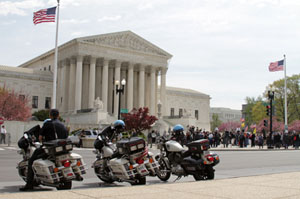At 1 p.m. sharp on Wednesday, the loud buzzer sounded, and from behind floor-length ruby curtains and four marble columns, the nine justices emerged to take their chairs.
Chief Justice John Roberts, seated in the center in a high-backed leather chair, quickly brought down the gavel. And the last of four hearings into the 2010 health care overhaul was underway.
Getting into the final historic hearing on Wednesday was surprisingly easy— even without a media pass or a special ticket from a member of Congress.
I first got in line outside the Court at 8 a.m. for the first hearing, which was to start at 10 a.m, on the issue of severability, or what would happen to the health law’s other provisions if the justices strike down the individual insurance mandate. While the passes to the full one-hour hearing were already spoken for by earlier birds, I was one of about 150 people who snagged a “three-minute pass” which enabled me to go into the chamber for what turned out to be about six minutes. I did that twice.
For the afternoon hearing into whether the Medicaid expansion of the health law was constitutional, I got lucky and was one of about 60 people who were able to get a gray ticket for the the full, one-hour segment. After making my way through a magnetometer, then up about 25 marble steps — with a brief a stop at a 25-cent locker to store all my electronics and other bags — and through another metal detector, I was ready to enter the chamber. My seat was in the rear, about 15 rows from the front, but afforded a full view of all nine justices.
Justice Elena Kagan took the offensive from the start, focusing her attention on Paul Clement, the 26 states’ plaintiff attorney, who argued that the Medicaid expansion was coercive to states and, thus, unconstitutional. “There’s no matching funds requirement, there are no extraneous conditions attached to it, it’s just a boatload of federal money for you to take and spend on poor people’s healthcare,” Kagan said. “It doesn’t sound coercive to me, I have to tell you.”
All the liberal-leaning judges — including Sonia Sotomayor, Stephen Breyer and even soft-spoken Ruth Bader Ginsburg — attacked Clement’s argument.
While the subject matter got deep very quickly, Justice Antonin Scalia was a reliable source of levity. When Clement said he had three reasons why the Medicaid expansion was illegal, Scalia interrupted: “What are your second and third? I’m on pins and needles.” The courtroom erupted in laughter.
Scalia even started one question by saying: “Mr. Clement, the chief (justice) has said I can ask this.” Roberts interjected, “He doesn’t always check first.” More laughter from the court.
Scalia even brought a touch of Hollywood to the exchange, comparing the health law’s funding for states to expand their Medicaid programs — which he called “coercive” — to an old Jack Benny joke.
“I think you know the old Jack Benny thing, ‘your money or your life,’ and, you know, he says, ‘I’m thinking, I’m thinking.’ It’s funny, because it’s no choice. You know? Your life? Again, it’s just money. It’s an easy choice. No coercion, right? I mean — right?”
Scalia put the government’s top lawyer on the hot seat when he asked Solicitor General Donald Verrilli Jr. to name a situation where federal money to states would be seen as coercive. When Verrilli said he could not think of a case, Scalia said, “I can’t think of one. I’m not blaming you for not thinking of one.” More laughter.
Even Verrilli elicited some laughter. After he gave a particularly weak response to Roberts’ concerns about the constutionality of the Medicaid expansion, Robert said he had 15 minutes of additional time to make his case. “Lucky me,” Verrilli replied.
While the courtroom was packed with nearly 500 people, it was library quiet. At least six security guards stood watch, making sure no one spoke out, ruffled papers too loudly or even stood in the back.
At 2:24 the final hearing was over, and Roberts gaveled the session to a close.
And now we wait for a ruling.







